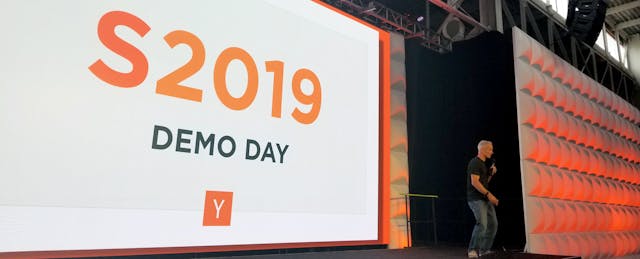The education industry’s current fascination with income share agreements—in which students typically pay a percent of their future income in lieu of upfront tuition—is no better exemplified than in the current crop of graduates from Y Combinator. More than half of the accelerator’s current education companies offer ISAs to attract students to their services.
“What a great model—it’s an amazing education for people for free,” says Geoff Ralston, president of Y Combinator. “We are seeing these spread around the world.”
To be fair, ISAs still face questions from regulators. And critics have questioned whether the model may be financially advantageous to every student.
This is the second of Y Combinator’s two yearly batches. (Here’s who presented in 2019’s first cohort.) Presenters at this week’s Demo Day include coding schools, a program to organize student loans and a startup that matches nascent developers with senior mentors to build projects for potential employers. The accelerator provides companies with $150,000 in seed funding for 7 percent of the company. Here’s a look at the latest edtech crop.
Blair
While studying abroad at the University of Southern California in Los Angeles, Mike Mahlkow saw how financing American education differs from that of his home country of Germany. Namely, that confusing loan terms and a lack of payment plan varieties left students with debilitating amounts of debt.
Mahlkow thought that Americans could benefit from a payment plan more common in Germany: Income share agreements. Now, he and his two co-founders—Constantin Schreiber and David Nordhausen—have turned ISAs into a business through their startup, Blair. Based in San Francisco and founded in February, the company offers ISAs for as low as $1,000 and as high as $25,000, no matter the major.
The loans come with no interest rates and repayment starts one to six months after graduation, with Blair’s revenue coming from a cut of the repayments. The ISAs range from .1 percent and 15 percent of people’s future income depending on their circumstances with typical repayment periods of around five years.
Blair takes 2 percent of repayments and another 20 percent after funds hit a certain return for their investors. Mahlkow declined to say how much he’s raised to date but says he’s received funding from individual and institutional investors.
Blair also helps place users into jobs and offers mentorship, resume help and interview training. The current batch of students are mostly computer science, nursing and business students, but the company has received applicants from a variety of backgrounds.
The company has disbursed money to about 15 students so far and has funds for about 30 more students. Blair is still accepting applications for the current fund and is raising capital for a fund to service 200 students that will go live in the fall.
He’s received applications for over $7 million in funding. Applicants use the company website to request a certain amount and provide information, then receive a quote from Blair. Mahlkow says the growing use of ISAs among bootcamps and other educational bodies has helped people understand his business.
“It’s become more and more recognized in the States,” he says of ISAs. “It’s good timing. More people have heard of it.”

GitStart
Hamza Zia’s coding career started during high school, working weekends and evenings building a website for a computer parts store in Manchester, England. He says he’s grateful for the experience but feels he could have learned faster if he had a more senior developer to critique his code. “There was no feedback,” says Zia, 25. “If I’d had a senior person helping me, that would have been a huge win.”
This realization is at the core of Zia’s startup, GitStart, based in San Francisco. The company is one part coding contractor for companies, one part crash course for new developers. The developers work on simple tasks given by corporate clients—usually front-end development work doable within a week—and a more senior GitStart developer checks the code and provides feedback.
Corporate clients then review the code and pay if they accept. If the corporate clients liked the work and are interested in hiring the developer, GitStart will help land an interview. And if that GitStart developer is hired, the startup receives a month of salary as a finder’s fee.
Zia founded the company, originally called Murcul, in October 2017 in Hong Kong. Zia and his team spent almost two years building the tools and infrastructure so that developers can start coding from their web browsers immediately.
So far, 95 percent of GitStart’s code has been accepted by corporate clients within two review cycles. “We’re betting that they deliver high-quality work at scale,” Zia says of his developers.
The company now accepts developers from the Philippines, Brazil, Nigeria and India. The company has been bootstrapped for now but is fundraising to launch in the U.S. and Canada. GitStart also wants capital to increase pay to developers, which ranges between $800 and $4,000 a month depending on the coding tasks. The company is currently profitable but reinvests revenue on developing the platform.
Over 400 developers have worked at GitStart so far. The startup only started its job offers service in July and has already directly placed about 15 developers without taking a finder’s fee.
The company has 75 active developers now on the platform. Non-developer employees include Zia and one full-time employee in Nigeria.
GradJoy
Stay debt free was the advice Jose Bethancourt always heard from his parents and his girlfriend while he studied business at the University of Texas at Austin. But to relieve his family from financial pressure during college, Bethancourt took on $40,000 in loans before he graduated in May.
Not worrying about living expenses “really helped me focus 100 percent,” the 22-year-old says. “My generation, Generation Z, when you look at our balance sheets, they’re all liabilities.”
Inspired from his own confusion figuring out the best strategy for repaying his debt, Bethancourt has built an app to show people how much money they save by paying certain loans before others. His company, GradJoy, launched earlier this month and already helps students manage a collective $30 million in student loans.
Bethancourt declined to say how many users he currently has, but says the average loan debt for a user is around $40,000, with the higher loans around $250,000. GradJoy is not yet profitable.
He says his users are on track to save $3,000 on their loans and get out of debt four years faster. His initial target market are teachers because so few successfully receive loan forgiveness. The app supports all federal loans regardless of servicer. He’s exploring other types of debt for GradJoy.
The company is currently himself and another co-founder, who dropped out of college to help run the business. Bethancourt turned down a job at web security company Cloudflare to pursue his current startup, based in Austin so he can be near his alma mater.
Bethancourt founded the company in October, but it’s not his first startup experience. He co-founded and served as chief technology officer at TeacherTalent. The K-12 teacher recruiting tool was acquired in November and is now part of a similar company, Quality People.

Hatchways
For Jaclyn Ling’s second act as an entrepreneur, she thought back to how hard it felt to land a job as a college graduate who changed her major about five times. She decided to dedicate her next startup to job seekers who learned programming languages outside a classroom.
“We want to be that last stretch for self-taught programmers,” says Ling, 28. “A lot of self-taught candidates are overlooked because they might not stand out on paper.”
Hatchways, based in Toronto, provides new programmers with four weeks of remote help to build a project to impress on job interviews. The company also matches programmers with potential jobs and paid internships, with over 100 corporate partners.
The company is still experimenting with pricing for students, Ling says. But it will offer one price for students who want to pay immediately and an income share agreement for students who want to delay payment until they are hired.
Hatchways is on its second cohort of 20 students, having already graduated a group of 10. Half of them landed jobs within two weeks after the program, Ling says. The company consists of Ling, her co-founder and two full-time employees, she says. She is currently fundraising to add more engineers and more corporate clients to pair with jobseekers.
This isn’t Ling’s first go at a startup. Her previous company, Blynk, was acquired by Canadian instant messaging company Kik in 2015.
Juno College of Technology
Heather Payne’s coding school is going through some major changes. Juno College of Technology is the new name of a school known as HackerYou since its founding in 2012. The school will open a second campus next July, this one about 86 miles from its Toronto headquarters. And this past April, Juno introduced income share agreements to give students more payment options.
While many coding bootcamps are done virtually, Heather Payne has kept her operation strictly in person. “Everyone is trying to make education online, but we’ve seen the rise and fall of MOOCs,” says Payne, 32. “They’ve got it all wrong.”
After bootstrapping the operation all this time, Payne is now raising money for growth. Payne says the school has always been profitable. The school is faster and more economical than regular college, she claims. An eight-week precourse recommended to students before enrolling with Juno holds about 30 students a cohort. The regular course holds 40 students, with typically one instructor for every 10 students. Almost 70 percent of students land jobs within 90 days of graduation and 87 percent within 180 days.
Juno accepts Canadian dollars, but in U.S. dollars students can pay about $9,000 up front for the Toronto campus or accept an ISA for 17 percent of gross monthly income for two years after landing a job that pays at least $38,000. The ISA cap is about $13,600.
She has 35 full-time employees, half instructors and half in operations, and claims to place 69 percent of her students in jobs by 90 days after graduation. Her goal is for people to avoid the difficulties of digital courses and get all the benefits of a college education as a faster rate. “The university experience is 10 times better in every way,” she claims.
Microverse
Microverse offers a six- to eight-month program for any developers fluent in English who can commit to a full-time schedule. The school works on an income share agreement that requires students to pay back 15 percent of the salary once they make over $1,000 a month, with a cap of $15,000, founder Ariel Camus says.
As part of its business model, Microverse sells the ISAs to hedge funds and investors. Five percent of repayments also go into a nonprofit fund to provide female aspiring programmers with stipends to join Microverse. About 30 percent of his students are women, Camus claims.
Through the course, students will build at least 30 projects. Alumni can continue to access Microverse’s network of coaches and mentors, Camus says. The bootstrapped company launched in January and received 50,000 applicants from 208 countries. He’s graduated one cohort of 12 students and expects to reach 500 students before the end of the year.
The company has 11 full-time employees. He’s not yet profitable, but expects to be in the next 12 months. This is Camus’ second startup after he built TouristEye, a trip planning tool for which Camus raised over $500,000 and sold to travel guide publisher Lonely Planet in 2013.
Prenda
This Mesa, Ariz.-based startup helps teachers set up “microschools,” K-8 schools in homes and informal spaces for a group of eight to 10 children in grades K through eight.
The schools teach all academic subjects aligned with state standards with a focus on daily goal setting and group projects. The school doesn’t assess students with letter grades and has grown to 80 schools throughout Arizona.
Prenda was founded by Kelly Smith in April 2016, according to his LinkedIn account.

ScholarMe
At 16, Femi Adebogun already sold his first startup, a company that provided staffing agencies a way to automatically contact workers. Now, Adebogun is taking on simplifying college students’ application process for financial aid.
“Everyone tells you to apply for scholarships, but it’s so painful,” says Adebogun, who turns 20 after Demo Day. “The applications kept asking similar questions and asking for the same profile information. So I built some scripts to do it for me.”
He never intended his work to turn into a company. But now Adebogun and his two co-founders are working to grow ScholarMe, a tool providing a common application for FAFSA, scholarships, loans and income share agreements. ScholarMe is still fundraising to hire on engineers to build a mobile app. So far, the company has been web browser based.
Adebogun himself received scholarships to attend University of Redlands in Southern California. But he dropped out to run ScholarMe and base the company in New York.
The goal is to eventually automate other applications that ask for repeat information, like ones for credit cards and housing. “We never planned to turn it into a company,” he says of the technology behind ScholarMe. “It just made my life easier.”


